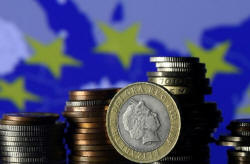|
Citing Trump and Brexit,
EU sees euro zone economy risk, sharp drop in UK growth
 Send a link to a friend
Send a link to a friend
 [February 13, 2017]
By Francesco Guarascio and Jan Strupczewski [February 13, 2017]
By Francesco Guarascio and Jan Strupczewski
BRUSSELS
(Reuters) - The European Commission said on Monday that uncertainty
about U.S. policies, Brexit and elections in Germany and France would
take their toll on the euro zone economy this year.
It forecast euro zone economic growth to lose some speed this year
before rebounding in 2018. It saw a sharp growth drop ahead in non-euro
zone and EU-leaver Britain.
The British economy will nearly halve its expansion by 2018, the
European Union executive said in a broad series of economic forecasts.
Growth in the 19 countries sharing the euro would slow to 1.6 percent
this year from 1.7 percent in 2016, but would gain speed in 2018 when
the bloc's gross domestic product (GDP) is expected to increase by 1.8
percent.
Germany, the bloc's leading economy by far, is expected to see its GDP
growth slow to 1.6 percent this year from 1.9 percent in 2016. Growth
will accelerate from 1.2 percent to 1.4 percent in France, and remain
stable at 0.9 percent in Italy.

Despite the slowdown from 2016, the euro zone growth forecasts were
slightly revised up for this year and 2018 from the Commission's
previous estimates released in November. Then, euro zone GDP was
estimated to grow 1.5 percent this year and 1.7 percent in 2018.
The revision was due to "better-than-expected performance in the second
half of 2016 and a rather robust start into 2017," the Commission said,
noting however that "the outlook is surrounded by higher-than-usual
uncertainty."
TRUMP, BREXIT
The "still-to-be-clarified" intentions of U.S. President Donald Trump in
"key policy areas" are seen as the first cause of uncertainty for the
bloc's economy.
In the near term, the possible package of U.S. fiscal stimulus "could
provide a stronger boost to global GDP than currently expected", the
Commission said.
However, in the medium term "potential disruptions associated with
shifting U.S. positions on trade policy could damage international
trade," it said.
The Commission is also waiting for clarifications from the Trump
administration on banking regulation, tax and fiscal cooperation, Pierre
Moscovici, the economics commissioner, told a news conference.
The European Union will face other political risks caused by divorce
negotiations with Britain, likely to begin in March, and elections in
several EU countries this year, including Germany and France, the
Commission said.
[to top of second column] |

Pound coins are seen in front of a displayed EU flag in this picture
illustration taken January 18, 2017. REUTERS/Dado Ruvic/Illustration

Britain is expected to pay a higher cost for the political uncertainty
surrounding Brexit talks. Its GDP growth is forecast to decline from 2.0
percent in 2016 to 1.5 percent this year, and to further slow down to
1.2 percent next year.
Britain's "business investment is likely to be adversely affected by
persisting uncertainty while private consumption growth is projected to
weaken as growth in real disposable income declines," the Commission
said.
The British unemployment rate is seen rising slightly to 5.6 percent in
2018 from 4.9 percent last year, while inflation will increase steeply
to 2.5 percent this year and 2.6 percent in 2018.
The gloomy forecasts on the British economic growth are, however, better
than previously estimated by the Commission which had predicted in
November Britain would grow 1.9 percent last year and only 1.0 percent
this year. The 2018 forecast is unchanged.
INFLATION
Consumer prices in the euro zone are forecast to markedly pick up this
year, as inflation will surge by 1.7 percent from 0.2 percent last year.
The 2017 estimate is higher than the 1.4 percent inflation growth
predicted by the Commission in November. The European Central Bank
predicted in December inflation would grow 1.3 percent this year.
But euro zone inflation is expected to slow again in 2018 to 1.4 percent
and core inflation, which excludes more volatile prices, is set to rise
only gradually.

This is still "short" of the ECB's target of an inflation "below, but
close to 2 percent", the Commission said.
However, this is not seen as sufficient to keep the ECB's stimulus plan
to continue indefinitely. "With inflation picking up from low levels, we
cannot expect current monetary stimulus to last forever," the
Commission's vice president Valdis Dombrovskis said, urging euro zone
states to continue structural reforms.
(Editing by Alissa De Carbonnel/Jeremy Gaunt)
[© 2017 Thomson Reuters. All rights
reserved.] Copyright 2017 Reuters. All rights reserved. This material may not be published,
broadcast, rewritten or redistributed. |